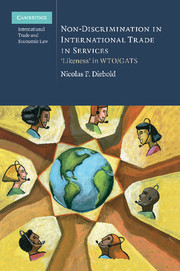Book contents
- Frontmatter
- Contents
- Foreword
- Acknowledgements
- Abbreviations
- List of Cases
- List of Legal Texts
- List of Documents
- Introduction
- PART I Foundations
- PART II Framing the conceptual breadth of ‘likeness’ in GATS
- PART III GATS specific ‘likeness’ issues
- 9 The scope of GATS rules on non-discrimination
- 10 ‘Likeness’ across ‘services’ and ‘suppliers’
- 11 ‘Likeness’ across ‘methods’ and ‘modes’ of supply
- 12 Concluding summary: merged test and crossover ‘likeness’
- PART IV Methodology for the ‘likeness’ analysis in GATS
- Bibliography
- Index
9 - The scope of GATS rules on non-discrimination
Published online by Cambridge University Press: 10 January 2011
- Frontmatter
- Contents
- Foreword
- Acknowledgements
- Abbreviations
- List of Cases
- List of Legal Texts
- List of Documents
- Introduction
- PART I Foundations
- PART II Framing the conceptual breadth of ‘likeness’ in GATS
- PART III GATS specific ‘likeness’ issues
- 9 The scope of GATS rules on non-discrimination
- 10 ‘Likeness’ across ‘services’ and ‘suppliers’
- 11 ‘Likeness’ across ‘methods’ and ‘modes’ of supply
- 12 Concluding summary: merged test and crossover ‘likeness’
- PART IV Methodology for the ‘likeness’ analysis in GATS
- Bibliography
- Index
Summary
The GATS negotiating history shows how some Members specifically pointed out that GATT rules on non-discrimination ‘had been set up for products, not for producers (or activities), and it was therefore difficult to see how it could be applied to services, the imports of which were not covered by customs duties at the border as was the case with trade in goods’. In spite of these concerns, the principle of non-discrimination has been included in the GATS framework both as MFN and national treatment, with the innovative feature that it applies not only to the service, but also extends to the supplier. This chapter presents a general overview of the various issues arising from the inclusion of service suppliers in GATS rules on non-discrimination. It discusses the different reasons for which non-discrimination in services trade is only effective if it applies to the service and its supplier (below, I.), followed by a legal definition of the term ‘service supplier’ (II.).
Reasons for including ‘suppliers’ in GATS rules on non-discrimination
The inseparability between the service and its supplier constitutes the main reason for which the regulation of international trade in services requires the expansion of obligations such that they apply to natural persons and companies. This inseparability entails not only consequences for the way Members regulate services domestically, but also for how services are traded internationally.
- Type
- Chapter
- Information
- Non-Discrimination in International Trade in Services‘Likeness' in WTO/GATS, pp. 177 - 185Publisher: Cambridge University PressPrint publication year: 2010



